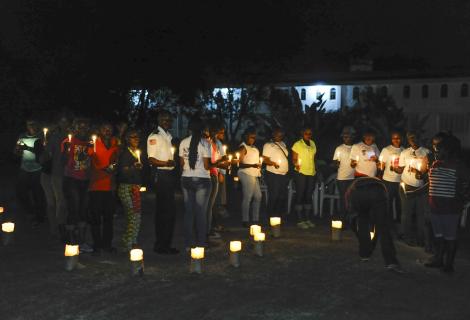Young people might be more resilient to the virus, but not to its impacts

By Katherine Robinson, youth engagement adviser, ActionAid International
Young people may be slightly more resilient than older folks, but with multiple recorded cases of young people succumbing to the virus, the World Health Organisation (WHO)’s director general Tedros Adhanom Ghebreyesus has cautioned: “I have a message for young people… you are not invincible.” And, we are certainly not resilient to its social and economic impacts. The intersecting crises facing young people were already dire, add Covid-19, and the situation is almost hopeless.
With forty years of social protections being rolled back through the commodification of basic rights, rampant privatisation of public services like healthcare and education, insurmountable student debt, ever-rising global youth unemployment and climate chaos, now exacerbated by Covid-19, young people are being thrust into fragility and precarity. Only radical transformation of our economic system will enable ours and future generations to withstand the devastating impacts of this pandemic.
A recent report shows how International Monetary Fund-induced austerity measures are negatively impacting about 75% of the world population. This brutal, profit-driven policy advice advanced by international financial institutions has rolled back social solidarity policies and universal social protections, especially weakening two of the main defences against coronavirus – housing and healthcare.
The UN special rapporteur on the right to adequate housing, Leilani Farha, finds that approximately 1.8 billion people worldwide are homeless, live in inadequate housing or crowded conditions, lacking water and sanitation. She has challenged governments globally to make the elimination of homelessness a top human rights priority with particular attention on young people and other marginalised groups like LGBTQ youth, considering the same harsh austerity and privatisation policies increase homelessness among young people. The International Labour Organisation (ILO) estimates that Covid-19 is putting 25 million jobs at risk, so homelessness is set to rise dramatically.
The ILO has also found young people make up the majority of refugees and migrants – around 70% are younger than 30. Homeless or not, young migrants, young women and LGBTQ youth face multiple levels of exclusion and discrimination. During crises, lockdown and quarantine, they are often targeted and scapegoated, they are also more vulnerable to gender, queerphobic and xenophobic violence, and secondary victimisation. They are less able to seek recourse, protection and healthcare, due to the stigma and prejudice that accompanies their marginal status.
Health systems globally, particularly in Africa, are devastatingly under-resourced. The IMF and World Bank have pushed governments to reduce health budgets, cut public sector wages, and have instead emboldened corporations to deliver public services. This has failed dismally across the world.
Amid Covid-19, the Spanish government has had to convert the recent venue for the UN climate conference, COP25, into a quarantine centre, turn an ice rink into a mortuary, and nationalise private hospitals, demonstrating that universal health can and should only be achieved through public funding, delivery and management by the state. Meanwhile, as infection rates rocket in the UK, private hospitals will rent 8,000 beds to the British government at £2.5 million a day.
Young people are burdened by student debt – a whopping $1.5 trillion in the US, alone. Even before coronavirus hit, they were finding it increasingly difficult to cover their living expenses, let alone healthcare or rent. Together with labour market flexibility, the rise of the ever-precarious gig economy and all-round attacks on labour unions and collective power, many young people cannot find decent jobs.
Covid-19 will only worsen existing crises in young people’s employment opportunities. The ILO’s latest Global Youth Employments Trends is a grim picture amid this pandemic. Young people are three times as likely as adults (25 years and older) to be unemployed. Unemployment is more prevalent among young women in most regions. Globally, one-fifth of young people are currently not in employment, education or training (NEET), a large majority of whom are young women – many contributing to the economy through a heavy burden of unpaid care work, which will become even heavier during this crisis. Globally, young women are twice as likely as young men to have NEET status.
Young workers continue to face high rates of poverty and are increasingly exposed to non-standard, informal and less secure forms of employment. Even among young people who are engaged in employment, 13% of young workers are suffering extreme poverty while 71 million of them, or 17% live in moderate poverty.
Covid-19 is exposing our economic system for what it is: oppressive and feeble. This pandemic is rendering neoliberalism’s favourite trope – ‘there is no alternative’ – a total fallacy. There are indeed alternatives, we’re seeing states quickly intervening with rescue packages in an attempt to mitigate the social and economic impacts of the crisis, such as nationalising healthcare, freezing payments on mortgages, utilities and taxes, providing emergency homes, water and sanitation to the homeless.
There is no going back to free market fundamentalism post-coronavirus. And that is where there is hope. If we can do it now, in a time of extreme crisis, then we can do it always. States can and should have to provide universal social protection, gender-responsive public services, housing and decent work. Young people’s present and future relies on it.
Author bio:
Katherine leads ActionAid International's work with and for young people on women's rights, resilient livelihoods, economic and climate justice. She is a young queer feminist based in Johannesburg. Her advocacy and media work includes advancing gender justice, LGBTQ+ rights, Palestinian solidarity, and social justice.